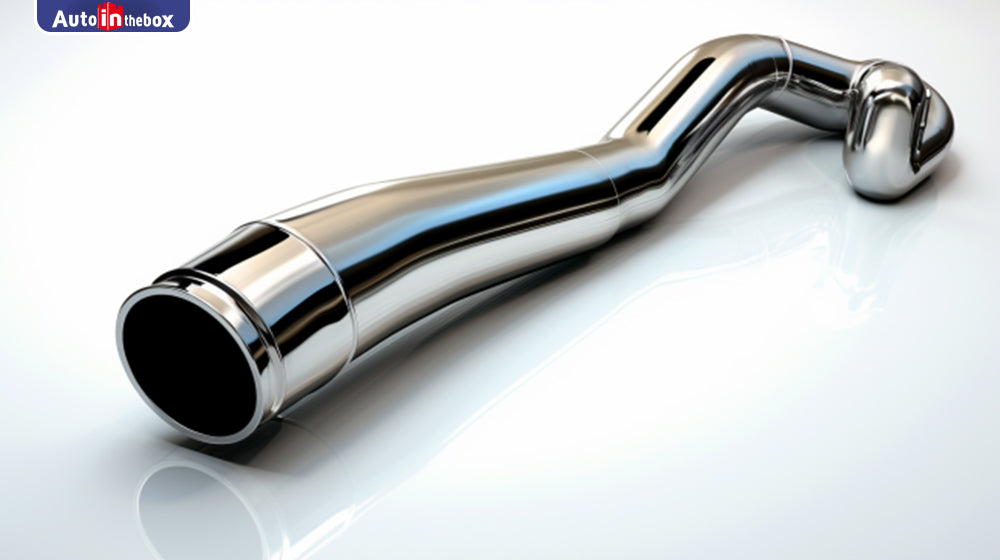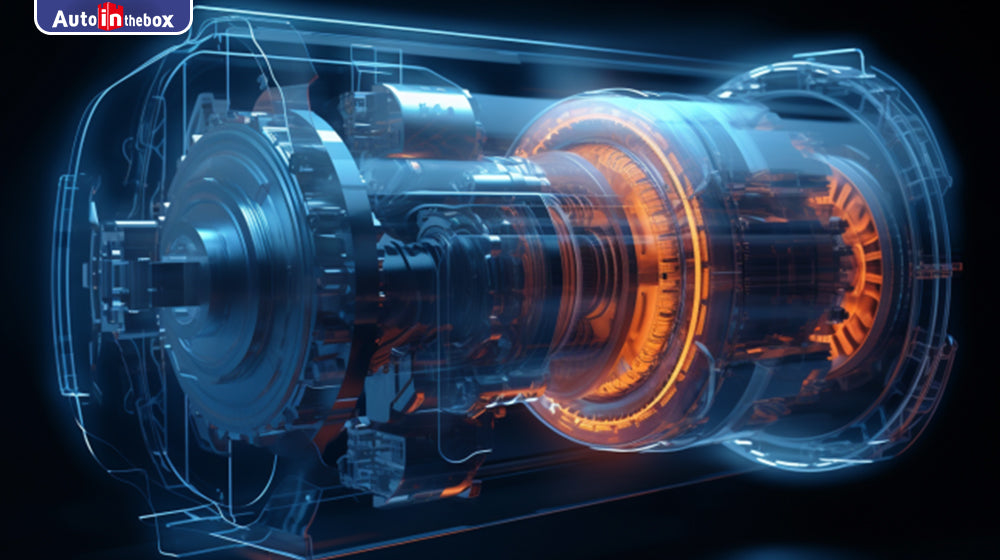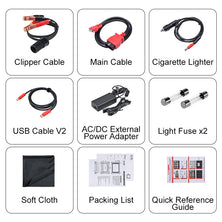
Why Is My Exhaust pipe Making unusual noise or smell?
The exhaust pipe is a component of a vehicle's exhaust system that carries the exhaust gases from the engine to the rear of the vehicle. Its primary function is to expel the harmful gases generated during the combustion process. The exhaust pipe is typically made of metal and is designed to withstand high temperatures and corrosive gases. It plays a crucial role in reducing engine noise and directing exhaust gases away from the vehicle's occupants and the environment.
Recommended 2023 top car diagnostic tool:Launch crp919X,Autel IM608II,Launch pro5,Launch IMMO elite,Launch PADVII
It is important to address any unusual noise or smell coming from the exhaust pipe promptly, as it could indicate underlying issues with the vehicle's exhaust system or engine performance. Consulting a qualified mechanic or technician is advisable to diagnose and resolve the problem effectively.
It is important to address any unusual noise or smell coming from the exhaust pipe promptly. Seeking professional assistance from a qualified mechanic or technician can help diagnose and rectify the underlying issues, ensuring safety, performance, and environmental compliance of the vehicle.
By following these preventive measures, you can reduce the chances of experiencing unusual noise or smell from the exhaust pipe. Regular maintenance, proper driving habits, and timely repairs contribute to the longevity and optimal performance of the exhaust system.
Recommended 2023 top car diagnostic tool:Launch crp919X,Autel IM608II,Launch pro5,Launch IMMO elite,Launch PADVII
Causes of Exhaust Pipe Making Unusual Noise or Smell:
- Damaged or Loose Components: A common reason for an exhaust pipe to produce unusual noise is due to damaged or loose components. This can include a cracked or broken pipe, loose clamps or hangers, or a damaged muffler. These issues can result in rattling, hissing, or metallic clanging sounds.
- Exhaust System Leaks: When there is a leak in the exhaust system, such as a faulty gasket or a loose connection, it can lead to both noise and unusual smells. Leaks can cause a ticking or hissing noise, and the presence of exhaust gases escaping from the system can create a distinct sulfur-like smell.
- Exhaust Restriction or Blockage: If the exhaust pipe becomes restricted or blocked, it can cause abnormal noise and odors. This can occur due to a build-up of carbon deposits, debris, or even a collapsed catalytic converter. The restriction disrupts the flow of exhaust gases, leading to increased backpressure, which can result in a loud rumbling noise and a burning smell.
- Engine Issues: Problems with the engine can also manifest as unusual noise or smells coming from the exhaust pipe. For instance, a misfiring engine or a faulty oxygen sensor can cause an imbalance in the air-fuel mixture, resulting in incomplete combustion. This can lead to popping or backfiring sounds, as well as a strong odor of unburned fuel.
- Exhaust System Corrosion: Over time, the exhaust pipe and other components of the exhaust system can corrode, especially in areas with harsh climates or road salt usage. Corrosion can cause weakened spots, holes, or rusted-through sections, leading to air leaks, increased noise, and the emission of a metallic or burning odor.
- Contaminated Exhaust Fluid: In vehicles equipped with selective catalytic reduction (SCR) systems, if the exhaust fluid (such as AdBlue) becomes contaminated or depleted, it can cause abnormal smells. A malfunctioning SCR system can emit a strong ammonia-like odor, indicating the need for fluid replacement or system repairs.
It is important to address any unusual noise or smell coming from the exhaust pipe promptly, as it could indicate underlying issues with the vehicle's exhaust system or engine performance. Consulting a qualified mechanic or technician is advisable to diagnose and resolve the problem effectively.
Impacts of Exhaust Pipe Making Unusual Noise or Smell:
- Safety Concerns: Unusual noises or smells coming from the exhaust pipe can be indicators of underlying issues with the vehicle's exhaust system or engine. These issues can affect the overall safety of the vehicle, as they may indicate leaks, blockages, or malfunctions that can lead to reduced performance, increased emissions, or potential breakdowns while driving.
- Environmental Impact: A malfunctioning exhaust system can result in increased emissions of harmful gases and pollutants. This can contribute to air pollution and negatively impact the environment. Additionally, if there is a leak or blockage in the exhaust pipe, it may release toxic gases, such as carbon monoxide, which can be dangerous to both humans and the environment.
- Decreased Engine Performance: Problems with the exhaust system can adversely affect the engine's performance. Issues like exhaust restrictions or engine misfires can lead to reduced power, decreased fuel efficiency, and overall poor engine operation. This can result in lower vehicle performance, increased fuel consumption, and higher maintenance costs.
- Potential Damage to Other Components: Unusual noises or smells from the exhaust pipe may be symptomatic of larger problems within the exhaust system. If left unaddressed, these issues can potentially cause damage to other components, such as the catalytic converter, oxygen sensors, or even the engine itself. Timely repairs and maintenance can help prevent further damage and costly repairs.
- Legal Compliance: In many regions, vehicles are required to meet certain emissions standards and noise regulations. A malfunctioning exhaust system that produces excessive noise or emissions may lead to non-compliance with local laws and regulations. This can result in fines, penalties, or even restrictions on vehicle usage until the issue is resolved.
- Passenger Comfort: Unusual smells or loud noises from the exhaust pipe can be unpleasant and discomforting for the vehicle occupants. Foul odors or excessive noise can make the driving experience less enjoyable and potentially affect passenger comfort, especially during long journeys.
It is important to address any unusual noise or smell coming from the exhaust pipe promptly. Seeking professional assistance from a qualified mechanic or technician can help diagnose and rectify the underlying issues, ensuring safety, performance, and environmental compliance of the vehicle.
Preventive Measures for Exhaust Pipe Making Unusual Noise or Smell:
- Regular Maintenance: Follow a scheduled maintenance routine for your vehicle, including regular inspections of the exhaust system. This allows early detection of any issues or potential problems with the exhaust pipe before they escalate and cause unusual noise or smell.
- Quality Repairs and Replacements: When addressing exhaust system repairs or replacements, ensure high-quality parts and materials are used. Cheap or inferior components can wear out quickly, leading to premature failures and abnormal noises. Opt for reputable brands and seek professional assistance for repairs and replacements.
- Avoiding Excessive Idling: Excessive idling can cause the buildup of carbon deposits in the exhaust system. This can lead to blockages and restricted airflow, resulting in abnormal noise and reduced performance. Minimize idling time and consider turning off the engine when stationary for extended periods.
- Regular Cleaning: Periodically clean the exhaust pipe to remove dirt, debris, and road salt that can accumulate on its surface. This helps prevent corrosion and blockages that can lead to unusual noise and odor. Use appropriate cleaning products and techniques recommended for your vehicle's exhaust system.
- Careful Driving: Avoid driving over rough terrains or speed bumps at high speeds, as this can cause damage to the exhaust pipe and its components. Additionally, be cautious when parking or maneuvering the vehicle to avoid hitting curbs or other obstacles that can dent or damage the exhaust system.
- Monitor Fluid Levels: For vehicles equipped with SCR systems that require exhaust fluid, regularly monitor the fluid levels and ensure it is topped up as needed. This helps maintain proper system functioning and prevents the emission of abnormal odors.
- Address Engine Issues Promptly: Any engine performance issues, such as misfires or abnormal fuel consumption, should be addressed promptly. These problems can directly impact the exhaust system and contribute to unusual noises or smells. Regular engine maintenance and timely repairs can help prevent such issues.
- Professional Inspections: Periodically have your vehicle's exhaust system inspected by a qualified mechanic or technician. They can identify potential problems, such as leaks, loose connections, or worn-out components, and take preventive measures to avoid unusual noise or smell in the exhaust pipe.
By following these preventive measures, you can reduce the chances of experiencing unusual noise or smell from the exhaust pipe. Regular maintenance, proper driving habits, and timely repairs contribute to the longevity and optimal performance of the exhaust system.
Solutions for Exhaust Pipe Making Unusual Noise or Smell:
- Identify the Cause: The first step in addressing the issue is to identify the specific cause of the unusual noise or smell. This may require a visual inspection of the exhaust pipe and system, as well as diagnostic tests to pinpoint the underlying problem.
- Repair or Replace Damaged Components: If the noise or smell is attributed to damaged or loose components, such as a cracked pipe, loose clamps, or a faulty muffler, the affected parts should be repaired or replaced. This may involve welding or sealing cracks, tightening connections, or installing new components as necessary.
- Fix Exhaust Leaks: In case of exhaust leaks, such as faulty gaskets or loose connections, the leaks should be identified and fixed. This may involve replacing gaskets, tightening connections, or using high-temperature sealants to ensure a proper seal and prevent the escape of exhaust gases.
- Clear Blockages or Restrictions: If there is a blockage or restriction in the exhaust pipe, it needs to be cleared to restore proper airflow. This can be done by removing debris, carbon buildup, or replacing a collapsed or clogged catalytic converter. Professional cleaning or replacement may be necessary depending on the severity of the blockage.
- Address Engine Issues: If engine problems, such as misfires or imbalanced air-fuel mixture, are contributing to the unusual noise or smell, those issues should be resolved. This may involve repairing or replacing faulty spark plugs, oxygen sensors, or addressing any other engine-related problems.
- Corrosion Treatment and Protection: If corrosion is the underlying cause, the affected areas of the exhaust pipe should be treated and protected. This can involve sanding or wire-brushing the corroded sections, applying rust inhibitors or high-temperature paint, or replacing severely corroded parts.
- Fluid Replacement: For vehicles with SCR systems, if the exhaust fluid is contaminated or depleted, it should be replaced with fresh, high-quality fluid. This ensures proper functioning of the system and eliminates any abnormal smells associated with fluid degradation.
- Professional Assistance: It is recommended to seek professional assistance from a qualified mechanic or technician for diagnosing and resolving complex exhaust system issues. They have the expertise and tools to accurately identify the problem and perform the necessary repairs or replacements.
It's important to address any unusual noise or smell from the exhaust pipe promptly to prevent further damage and ensure the safe and efficient operation of the vehicle. Regular maintenance, timely repairs, and professional assistance play a key role in resolving exhaust system-related issues effectively.
Older Post
 Newer Post
Newer Post

What happens when a NOx sensor shows deviations or errors?

Transmission experiences jerking - what to do?










